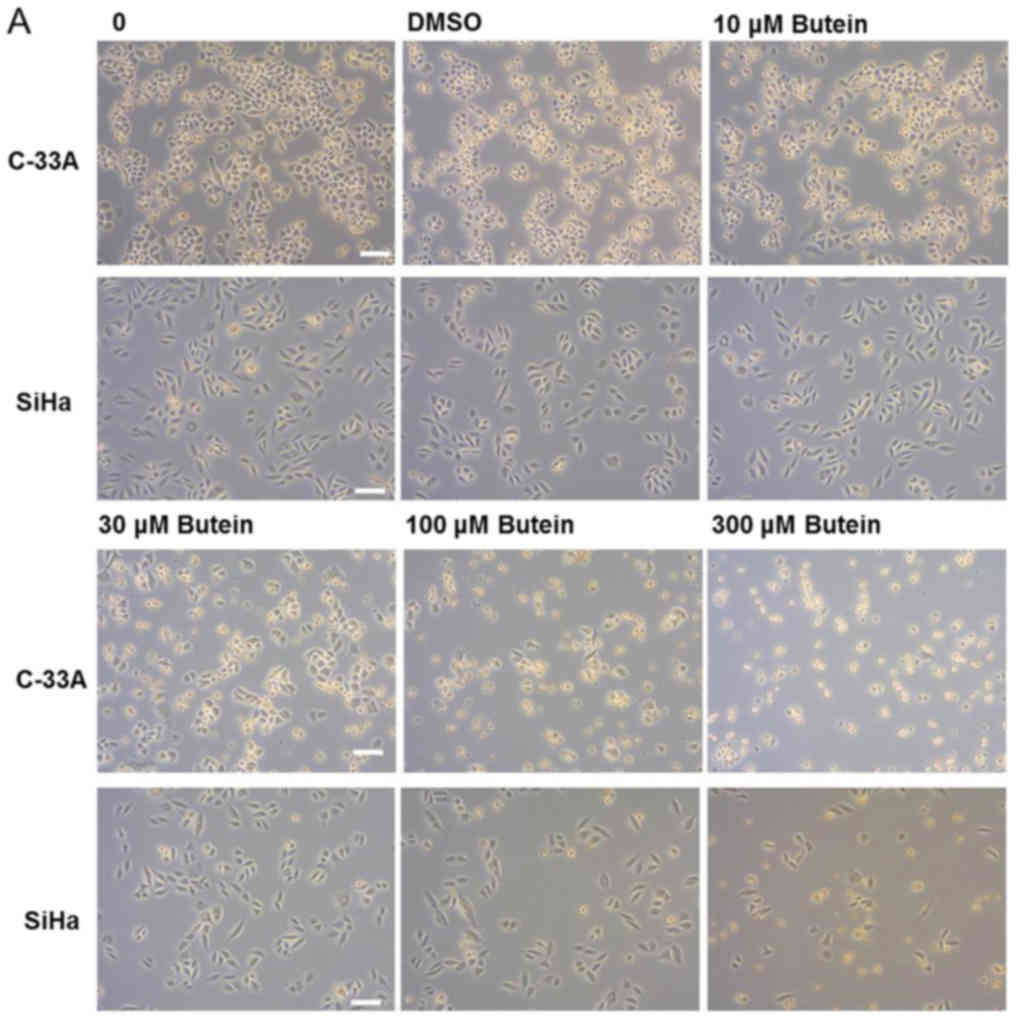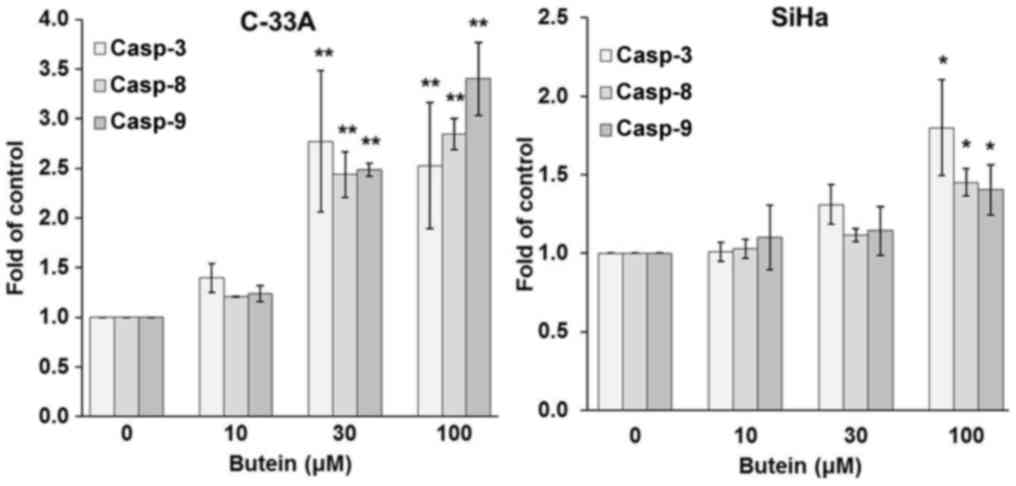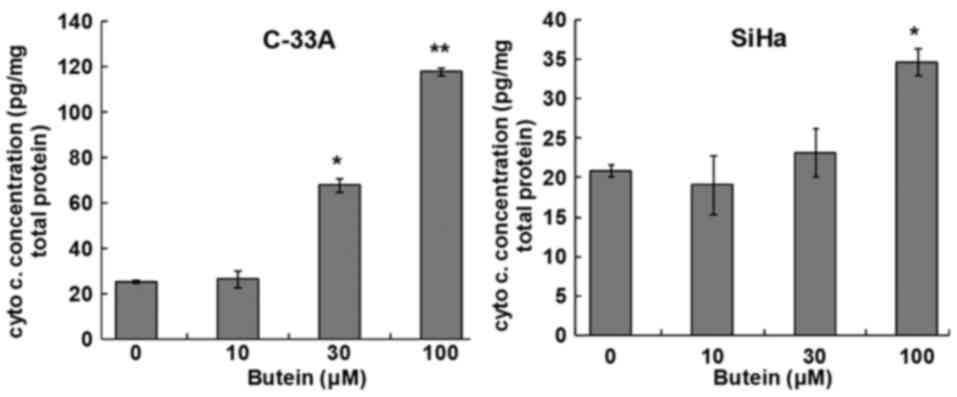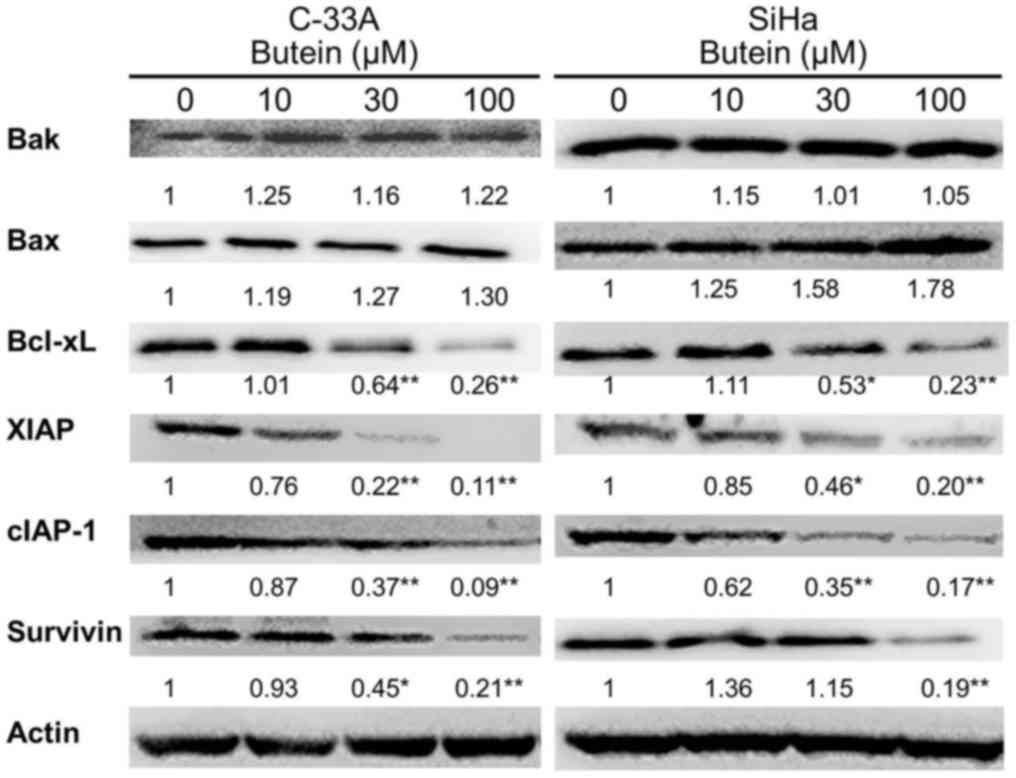|
1
|
Torre LA, Bray F, Siegel RL, Ferlay J,
Lortet-Tieulent J and Jemal A: Global cancer statistics, 2012. CA
Cancer J Clin. 65:87–108. 2015. View Article : Google Scholar : PubMed/NCBI
|
|
2
|
Hacker NF and Vermorken JB: Cervical
cancerBerek and Hacker's Gynecologic Oncology. 5 edition. Berek JS
and Hacker NF: Lippincott Williams and Wilkins; Philadelphia: pp.
336–378. 2015
|
|
3
|
Tewari KS, Sill MW, Long HJ III, Penson
RT, Huang H, Ramondetta LM, Landrum LM, Oaknin A, Reid TJ, Leitao
MM, et al: Improved survival with bevacizumab in advanced cervical
cancer. N Engl J Med. 370:734–743. 2014. View Article : Google Scholar : PubMed/NCBI
|
|
4
|
Gao H, Lamusta J, Zhang WF, Salmonsen R,
Liu Y, O'Connell E, Evans JE, Burstein S and Chen JJ: Tumor Cell
Selective Cytotoxicity and Apoptosis Induction by an Herbal
Preparation from Brucea javanica. N Am J Med Sci (Boston). 4:62–66.
2011. View
Article : Google Scholar : PubMed/NCBI
|
|
5
|
Takara K, Horibe S, Obata Y, Yoshikawa E,
Ohnishi N and Yokoyama T: Effects of 19 herbal extracts on the
sensitivity to paclitaxel or 5-fluorouracil in HeLa cells. Biol
Pharm Bull. 28:138–142. 2005. View Article : Google Scholar : PubMed/NCBI
|
|
6
|
Yang PY, Hu DN and Liu FS: Cytotoxic
effect and induction of apoptosis in human cervical cancer cells by
Antrodia camphorata. Am J Chin Med. 41:1169–1180. 2013. View Article : Google Scholar : PubMed/NCBI
|
|
7
|
Zhou Y, Liu YE, Cao J, Zeng G, Shen C, Li
Y, Zhou M, Chen Y, Pu W, Potters L and Shi YE: Vitexins,
nature-derived lignan compounds, induce apoptosis and suppress
tumor growth. Clin Cancer Res. 15:5161–5169. 2009. View Article : Google Scholar : PubMed/NCBI
|
|
8
|
Chan SC, Chang YS, Wang JP, Chen SC and
Kuo SC: Three new flavonoids and antiallergic, anti-inflammatory
constituents from the heartwood of Dalbergia odorifera. Planta Med.
64:153–158. 1998. View Article : Google Scholar : PubMed/NCBI
|
|
9
|
Jung CH, Kim JH, Hong MH, Seog HM, Oh SH,
Lee PJ, Kim GJ, Kim HM, Um JY and Ko SG: Phenolic-rich fraction
from Rhus verniciflua Stokes (RVS) suppress inflammatory response
via NF-kappaB and JNK pathway in lipopolysaccharide-induced RAW
264.7 macrophages. J Ethnopharmacol. 110:490–497. 2007. View Article : Google Scholar : PubMed/NCBI
|
|
10
|
Lee JC, Lim KT and Jang YS: Identification
of Rhus verniciflua Stokes compounds that exhibit free radical
scavenging and anti-apoptotic properties. Biochim Biophys Acta.
1570:181–191. 2002. View Article : Google Scholar : PubMed/NCBI
|
|
11
|
Song Z, Shanmugam MK, Yu H and Sethi G:
Butein and its role in chronic diseases. Adv Exp Med Biol.
928:419–433. 2016. View Article : Google Scholar : PubMed/NCBI
|
|
12
|
Padmavathi G, Roy NK, Bordoloi D, Arfuso
F, Mishra S, Sethi G, Bishayee A and Kunnumakkara AB: Butein in
health and disease: A comprehensive review. Phytomedicine.
25:118–127. 2017. View Article : Google Scholar : PubMed/NCBI
|
|
13
|
Yang EB, Zhang K, Cheng LY and Mack P:
Butein, a specific protein tyrosine kinase inhibitor. Biochem
Biophys Res Commun. 245:435–438. 1998. View Article : Google Scholar : PubMed/NCBI
|
|
14
|
Li Y, Ma C, Qian M, Wen Z, Jing H and Qian
D: Butein induces cell apoptosis and inhibition of cyclooxygenase-2
expression in A549 lung cancer cells. Mol Med Rep. 9:763–767. 2014.
View Article : Google Scholar : PubMed/NCBI
|
|
15
|
Rajendran P, Ong TH, Chen L, Li F,
Shanmugam MK, Vali S, Abbasi T, Kapoor S, Sharma A, Kumar AP, et
al: Suppression of signal transducer and activator of transcription
3 activation by butein inhibits growth of human hepatocellular
carcinoma in vivo. Clin Cancer Res. 17:1425–1439. 2011. View Article : Google Scholar : PubMed/NCBI
|
|
16
|
Chua AW, Hay HS, Rajendran P, Shanmugam
MK, Li F, Bist P, Koay ES, Lim LH, Kumar AP and Sethi G: Butein
downregulates chemokine receptor CXCR4 expression and function
through suppression of NF-κB activation in breast and pancreatic
tumor cells. Biochem Pharmacol. 80:1553–1562. 2010. View Article : Google Scholar : PubMed/NCBI
|
|
17
|
Yit CC and Das NP: Cytotoxic effect of
butein on human colon adenocarcinoma cell proliferation. Cancer
Lett. 82:65–72. 1994. View Article : Google Scholar : PubMed/NCBI
|
|
18
|
Zhang L, Chen W and Li X: A novel
anticancer effect of butein: Inhibition of invasion through the
ERK1/2 and NF-kappa B signaling pathways in bladder cancer cells.
FEBS Lett. 582:1821–1828. 2008. View Article : Google Scholar : PubMed/NCBI
|
|
19
|
Khan N, Adhami VM, Afaq F and Mukhtar H:
Butein induces apoptosis and inhibits prostate tumor growth in
vitro and in vivo. Antioxid Redox Signal. 16:1195–1204. 2012.
View Article : Google Scholar : PubMed/NCBI
|
|
20
|
Cui Z, Song E, Hu DN, Chen M, Rosen R and
McCormick SA: Butein induces apoptosis in human uveal melanoma
cells through mitochondrial apoptosis pathway. Curr Eye Res.
37:730–739. 2012. View Article : Google Scholar : PubMed/NCBI
|
|
21
|
Yang PY, Hu DN, Lin IC and Liu FS: Butein
shows cytotoxic effects and induces apoptosis in human ovarian
cancer cells. Am J Chin Med. 43:769–782. 2015. View Article : Google Scholar : PubMed/NCBI
|
|
22
|
Bai X, Ma Y and Zhang G: Butein suppresses
cervical cancer growth through the PI3K/AKT/mTOR pathway. Oncol
Rep. 33:3085–3092. 2015. View Article : Google Scholar : PubMed/NCBI
|
|
23
|
Lai YW, Wang SW, Chang CH, Liu SC, Chen
YJ, Chi CW, Chiu LP, Chen SS, Chiu AW and Chung CH: Butein inhibits
metastatic behavior in mouse melanoma cells through VEGF expression
and translation-dependent signaling pathway regulation. BMC
Complement Altern Med. 15:4452015. View Article : Google Scholar : PubMed/NCBI
|
|
24
|
Zhang L, Yang X, Li X, Li C, Zhao L, Zhou
Y and Hou H: Butein sensitizes HeLa cells to cisplatin through the
AKT and ERK/p38 MAPK pathways by targeting FoxO3a. Int J Mol Med.
36:957–966. 2015. View Article : Google Scholar : PubMed/NCBI
|
|
25
|
Cossarizza A, Baccarani-Contri M,
Kalashnikova G and Franceschi C: A new method for the
cytofluorimetric analysis of mitochondrial membrane potential using
the J-aggregate forming lipophilic cation
5,5′,6,6′-tetrachloro-1,1′,3,3′-tetraethylbenzimidazolcarbocyanine
iodide (JC-1). Biochem Biophys Res Commun. 197:40–45. 1993.
View Article : Google Scholar : PubMed/NCBI
|
|
26
|
Lee SH, Choi WC, Kim KS, Park JW, Lee SH
and Yoon SW: Shrinkage of gastric cancer in an elderly patient who
received Rhus verniciflua Stokes extract. J Altern Complement Med.
16:497–500. 2010. View Article : Google Scholar : PubMed/NCBI
|
|
27
|
Cho SG and Choi EJ: Apoptotic signaling
pathways: Caspases and stress-activated protein kinases. J Biochem
Mol Biol. 35:24–27. 2002.PubMed/NCBI
|
|
28
|
Frenzel A, Grespi F, Chmelewskij W and
Villunger A: Bcl2 family proteins in carcinogenesis and the
treatment of cancer. Apoptosis. 14:584–596. 2009. View Article : Google Scholar : PubMed/NCBI
|
|
29
|
Mace PD, Shirley S and Day CL: Assembling
the building blocks: structure and function of inhibitor of
apoptosis proteins. Cell Death Differ. 17:46–53. 2010. View Article : Google Scholar : PubMed/NCBI
|
|
30
|
de Almagro MC and Vucic D: The inhibitor
of apoptosis (IAP) proteins are critical regulators of signaling
pathways and targets for anti-cancer therapy. Exp Oncol.
34:200–211. 2012.PubMed/NCBI
|
|
31
|
Fulda S and Vucic D: Targeting IAP
proteins for therapeutic intervention in cancer. Nat Rev Drug
Discov. 11:109–124. 2012. View Article : Google Scholar : PubMed/NCBI
|
|
32
|
Varfolomeev E and Vucic D: Inhibitor of
apoptosis proteins: Fascinating biology leads to attractive tumor
therapeutic targets. Future Oncol. 7:633–648. 2011. View Article : Google Scholar : PubMed/NCBI
|
|
33
|
Wang S: Design of small-molecule Smac
mimetics as IAP antagonists. Curr Top Microbiol Immunol.
348:89–113. 2011.PubMed/NCBI
|
|
34
|
Eckelman BP, Salvesen GS and Scott FL:
Human inhibitor of apoptosis proteins: Why XIAP is the black sheep
of the family. EMBO Rep. 7:988–994. 2006. View Article : Google Scholar : PubMed/NCBI
|
|
35
|
Bertrand MJ, Milutinovic S, Dickson KM, Ho
WC, Boudreault A, Durkin J, Gillard JW, Jaquith JB, Morris SJ and
Barker PA: cIAP1 and cIAP2 facilitate cancer cell survival by
functioning as E3 ligases that promote RIP1 ubiquitination. Mol
Cell. 30:689–700. 2008. View Article : Google Scholar : PubMed/NCBI
|
|
36
|
Chen SM, Li YY, Tu CH, Salazar N, Tseng
YY, Huang SF, Hsieh LL and Lui TN: Blockade of inhibitors of
apoptosis proteins in combination with conventional chemotherapy
leads to synergistic antitumor activity in medulloblastoma and
cancer stem-like cells. PLoS One. 11:e01612992016. View Article : Google Scholar : PubMed/NCBI
|
|
37
|
Mita AC, Mita MM, Nawrocki ST and Giles
FJ: Survivin: Key regulator of mitosis and apoptosis and novel
target for cancer therapeutics. Clin Cancer Res. 14:5000–5005.
2008. View Article : Google Scholar : PubMed/NCBI
|
|
38
|
Zaffaroni N and Daidone MG: Survivin
expression and resistance to anticancer treatments: Perspectives
for new therapeutic interventions. Drug Resist Updat. 5:65–72.
2002. View Article : Google Scholar : PubMed/NCBI
|
|
39
|
Lin YF, Lai TC, Chang CK, Chen CL, Huang
MS, Yang CJ, Liu HG, Dong JJ, Chou YA, Teng KH, et al: Targeting
the XIAP/caspase-7 complex selectively kills caspase-3-deficient
malignancies. J Clin Invest. 123:3861–3875. 2013. View Article : Google Scholar : PubMed/NCBI
|
|
40
|
Sung B, Cho SG, Liu M and Aggarwal BB:
Butein, a tetrahydroxychalcone, suppresses cancer-induced
osteoclastogenesis through inhibition of receptor activator of
nuclear factor-kappaB ligand signaling. Int J Cancer.
129:2062–2072. 2011. View Article : Google Scholar : PubMed/NCBI
|
|
41
|
Moon DO, Choi YH, Moon SK, Kim WJ and Kim
GY: Butein suppresses the expression of nuclear factor-kappa
B-mediated matrix metalloproteinase-9 and vascular endothelial
growth factor in prostate cancer cells. Toxicol In Vitro.
24:1927–1934. 2010. View Article : Google Scholar : PubMed/NCBI
|
|
42
|
Soriano-Hernandez AD, Madrigal-Perez D,
Galvan-Salazar HR, Martinez-Fierro ML, Valdez-Velazquez LL,
Espinoza-Gómez F, Vazquez-Vuelvas OF, Olmedo-Buenrostro BA,
Guzman-Esquivel J, Rodriguez-Sanchez IP, et al: Anti-inflammatory
drugs and uterine cervical cancer cells: Antineoplastic effect of
meclofenamic acid. Oncol Lett. 10:2574–2578. 2015. View Article : Google Scholar : PubMed/NCBI
|
|
43
|
Moon DO, Kim MO, Choi YH and Kim GY:
Butein sensitizes human hepatoma cells to TRAIL-induced apoptosis
via extracellular signal-regulated kinase/Sp1-dependent DR5
upregulation and NF-kappaB inactivation. Mol Cancer Ther.
9:1583–1595. 2010. View Article : Google Scholar : PubMed/NCBI
|




















